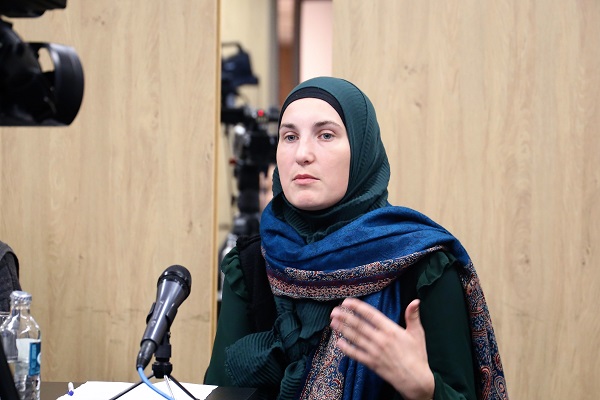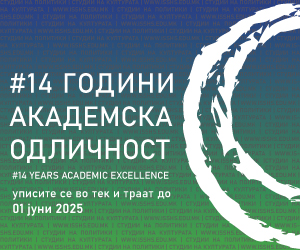by: Mersiha Smailovic
[dropcap font=”arial” fontsize=”45″]I[/dropcap]f I were to choose an identity, although my identity is already formed, I would, nevertheless, choose to have an identity that is also immortal. An identity that no one questions, the identity of humanity, to be a positive moment in society, to contribute in it…
Within the framework of everything that is happening to us in Republic of Macedonia, and that concerns the ordinary citizen, I think that at the moment I experience my identity as a citizen who pays taxes, who has no criminal offenses, maybe some ordinary, minor ones for wrong parking, a citizen who pays all possible taxes, and since I am owner of a company I also pay profit tax, and as a citizen who has no problem paying taxes as long as the state allocates funds for social assistance, a citizen who has no problem with the new pension for people over the age of 65. All those characteristics, as a citizen of the Republic of Macedonia, allow me to participate in making Macedonia a better environment, making Macedonia a better place for living, a place where there will be conditions for living for the young people, the elderly”…
I think that for the identity it is crucial – not to violate, but to respect the laws in Macedonia. In terms of other debates, I have written for CIVIL how people understand the identity associated with the ethnicity they belong to. On the subject – what is my identity, I can say that I reflect a beautiful picture for Macedonia, as a country of different cultures, nations and people…We have Macedonian Muslims who identify themselves as Torbeshi (Muslim Macedonians) or Goranci (Muslim Macedonians from the Gora region), depending on where they are coming from, or as my former grandmothers and grandfathers who moved within Yugoslavia and came to live in Macedonia…
However, the debate in Macedonia in terms of the Prespa Agreement has indeed created a space – for people to take the right to say who has, and who does not have the right to negotiate, or who has the right to talk about the identity within the framework of this agreement…
A large part of my ethnic community, the Bosniak, were labelled as not having the right to negotiate about the Macedonian identity. We come back again to the question: who has the right to negotiate, or is the identity something that can be negotiated, or is that some kind of feeling that we have inside of ourselves? I was born in Macedonia, but my identity as a member of the Bosniak community does not change, because I grew up with that identity, we speak Bosniak at home and I do not change that feeling, although we very rarely visit the place we are from in Serbia…
As to what Macedonian reflects, I have interesting things happen when I travel in countries where the population is predominantly Muslim. I was subject to particular profiling at the airport: probably because of my appearance, where my strong religious identity is obvious, I was detained and taken in a separate room to be questioned about who I am, what I am, what I am doing in that country…It was unfortunate that they did not know English, therefore the invitation I had for the conference did not help. Revolted, I asked: why are you keeping me, why did you bring me here? They did not answer, they did not know English, and all of this lasted 15 minutes…I experience similar things at European airports as well, where security is raised to a higher level. In those 15 minutes, one thought kept running in my head: “Too white to be a Muslim, and too Muslim to be a European citizen”.
Definitely, that is something you constantly face in that need to belong somewhere, that identity to be the key thing that will define you and to have everyone look at you through the prism of that identity. Indeed, that just makes the functioning more difficult in a normal society, one that we all dream of becoming. If I were to choose an identity, although my identity is already formed, I would, nevertheless, choose to also have an identity that is immortal. An identity that no one questions, the identity of humanity, to be a positive moment in a society, to contribute in it.
That is an identity that no one will disrupt or trample. With “dilemmas” – whether you are “too white to be a Muslim”, we are wasting too much productive time, wasting energy and entering debates on who has the right, and who does not, whether I should go to vote at the referendum, or who am I to call for people to vote at the referendum, who am I to bargain about the name and similar…All of these moments are a waste of time, instead of focusing on building a constructive society and building an identity that truly reflects Macedonia as such, such as a: multicultural, multi-ethnic, multi-religious society…With all those “multi” in front of you, we are coming back to some root problems about who we are and what we are…
What was interesting in relation to the debate on the referendum is that in the opposition party we have also such who do not belong to the Macedonian ethnic group. One of those representatives is a member of my, Bosniak, ethnic group, who was glorified as a hero, who voted for constitutional changes. The comments were: “Well, how could he, traitor!”. The other ethnic communities are always traitors…And again the feeling that, if you are a member of a group and want to be part of that group, you have to have that mainstream thinking and attitude…Something that is different is not accepted, as a way of thinking, as an ethnicity or community.
I think it is quite OK to have ethnically clean parties because the voters want that, the rhetoric before the elections is most intensified in terms of the ethnic moments. But I advocate an idea of a civic concept and an idea of identity where everyone will be allowed to choose and feel what they want. For everyone in Republic of Macedonia who contributes, who invests, who loves the country… for me, this is the key in this story.
Maybe when we criticize at public debates and conferences, wanting the system to be better, or for the state to be better, we want to talk about Macedonia before the international community – in a far better light. And when we talk about the identity, I hope that all the ethnic communities will rise to what our primary identity is. And that we will all build a society that will truly be a much better place for living, and that we will get an epithet that we are – citizens of Europe.
Regarding events around the world, it was interesting to hear the new representative in US Congress, who is from Somalia. She highlighted: I come with many “firsts”, I am the first refugee, the first Muslim with a scarf in Congress and the first woman with a different color of the skin, who will be representing her country…
While in the world many first and revolutionary things are taking place, unfortunately, we here are returning back to 1903, 1906, and all those nineties, whereas reality is happening now, the life we are living is now…I hope that the identity is just an opportunity and way for us to differentiate, to get to know each other, to socialize, to accept ourselves, and not to separate.
The article is part of the project “Identity Loss or …?” implemented by CIVIL in cooperation with the Heirich Böll Foundation.
This post is also available in: MacedonianAlbanian





